Publications
The Impact of Public Spending on Infant and Under-five Health in South Sudan
Author: Augustino Ting Mayai
Organization: American Journal of Medical Research
Type: External
Date: 25/03/2016
Keyword(s): child health, demography, early age mortality, health spending, multilevel mixed-effects, South Sudan, state effectiveness
ABSTRACT. Using nationally representative household sample survey, census, and state financial data, this analysis examines the relationship between child health and per capita health spending in South Sudan. The nexus between public health spending and health outcomes lends insights into state effectiveness in service delivery.
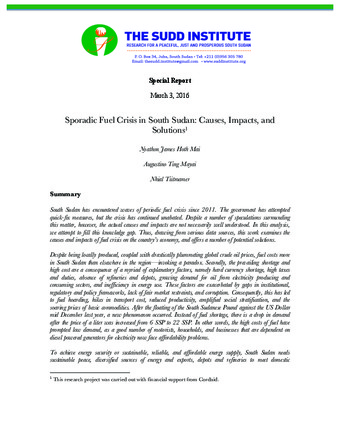
Sporadic Fuel Crisis in South Sudan: Causes, Impacts, and Solutions
Authors: Nyathon Hoth Mai, Nhial Tiitmamer, Augustino Ting Mayai
Organization: The Sudd Institute
Type: Special Reports
Date: 03/03/2016
Keyword(s): South Sudan
South Sudan has encountered waves of periodic fuel crisis since 2011. The government has attempted quick-fix measures, but the crisis has continued unabated. Despite a number of speculations surrounding this matter, however, the actual causes and impacts are not necessarily well understood.
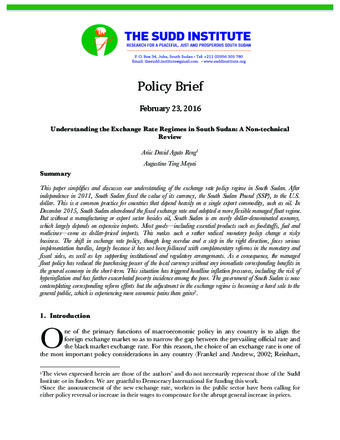
Understanding the Exchange Rate Regimes in South Sudan: A Non-technical Review
Authors: Ariic David Aguto Reng, Augustino Ting Mayai
Organization: The Sudd Institute
Type: Policy Briefs
Date: 23/02/2016
This paper simplifies and discusses our understanding of the exchange rate policy regime in South Sudan. After independence in 2011, South Sudan fixed the value of its currency, the South Sudan Pound (SSP), to the U.S. dollar.
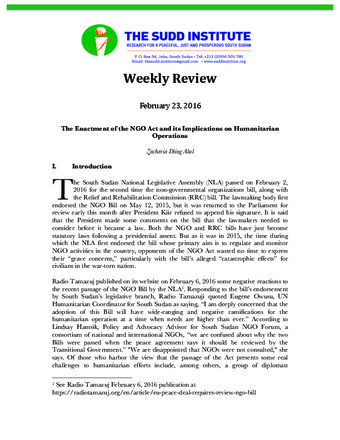
South Sudan’s Enactment of NGO Act and its Implications on Humanitarian Operations
Organization: The Sudd Institute
Type: Weekly Reviews
Date: 23/02/2016
The South Sudan National Legislative Assembly (NLA) passed on February 2, 2016 for the second time the non-governmental organizations bill, along with the Relief and Rehabilitation Commission (RRC) bill. The lawmaking body first endorsed the NGO Bill on May 12, 2015, but it was returned to the Parliament for review...
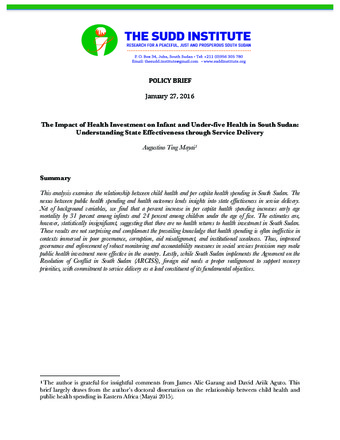
The Impact of Health Investment on Infant and Under-five Health in South Sudan: Understanding State Effectiveness through Service Delivery
Author: Augustino Ting Mayai
Organization: The Sudd Institute
Type: Policy Briefs
Date: 27/01/2016
This analysis examines the relationship between child health and per capita health spending in South Sudan. The nexus between public health spending and health outcomes lends insights into state effectiveness in service delivery. Net of background variables, we find that a percent increase in per capita health spending increases early...
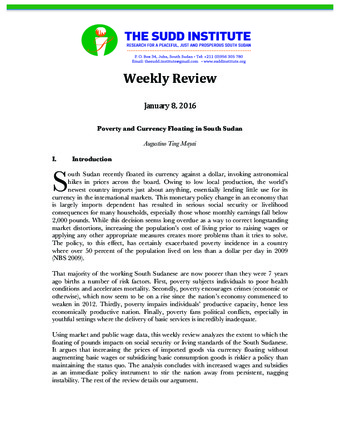
Poverty and Currency Floating in South Sudan
Author: Augustino Ting Mayai
Organization: The Sudd Institute
Type: Weekly Reviews
Date: 08/01/2016
South Sudan recently floated its currency against a dollar, invoking astronomical hikes in prices across the board. Owing to low local production, the world’s newest country imports just about anything, essentially lending little use for its currency in the international markets.
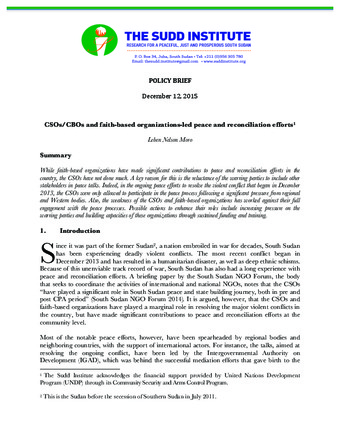
CSOs/CBOs and faith-based organizations-led peace and reconciliation efforts
Author: Leben Nelson Moro
Organization: The Sudd Institute
Type: Policy Briefs
Date: 12/12/2015
While faith-based organizations have made significant contributions to peace and reconciliation efforts in the country, the CSOs have not done much. A key reason for this is the reluctance of the warring parties to include other stakeholders in peace talks.
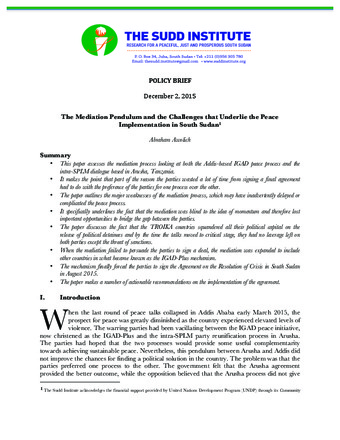
The Mediation Pendulum and the Challenges that Underlie the Peace Implementation in South Sudan
Author: Abraham Awolich
Organization: The Sudd Institute
Type: Policy Briefs
Date: 02/12/2015
This paper assesses the mediation process looking at both the Addis-based IGAD peace process and the intra-SPLM dialogue based in Arusha, Tanzania. It makes the point that part of the reason the parties wasted a lot of time from signing a final agreement had to do with the preference of...
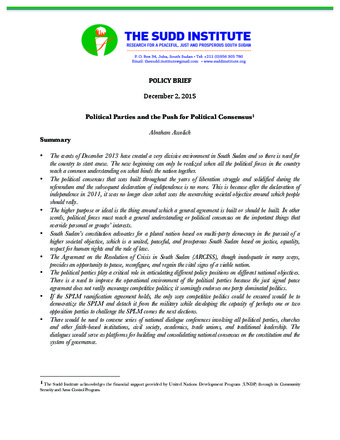
Political Parties and the Push for Political Consensus
Author: Abraham Awolich
Organization: The Sudd Institute
Type: Policy Briefs
Date: 02/12/2015
The events of December 2013 have created a very divisive environment in South Sudan and so there is need for the country to start anew. The new beginning can only be realized when all the political forces in the country reach a common understanding on what binds the nation together.
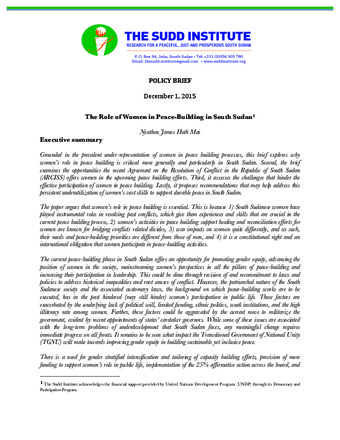
The Role of Women in Peace-Building in South Sudan
Author: Nyathon Hoth Mai
Organization: The Sudd Institute
Type: Policy Briefs
Date: 01/12/2015
Grounded in the prevalent under-representation of women in peace-building processes, this brief explores why women’s role in peace-building is critical more generally and particularly in South Sudan. Second, the brief examines the opportunities the recent Agreement on the Resolution of Conflict in the Republic of South Sudan (ARCISS) offers women...
